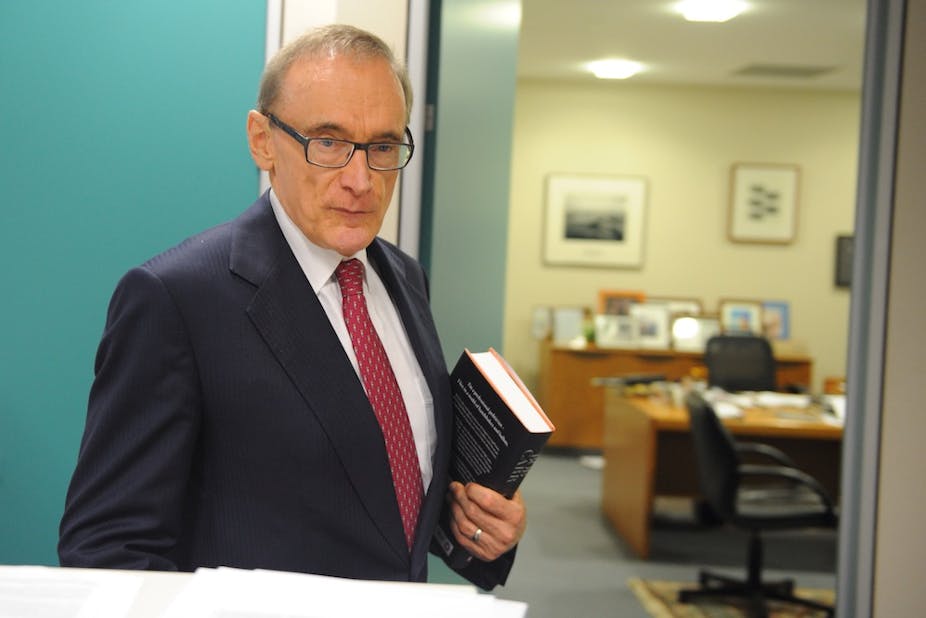A defiant Bob Carr says he is proud to have resisted the bullying influence of the pro-Israel lobby on the Gillard government, after critics have accused him of bigotry and making claims just to sell his new book.
In his tell-all “Diary of a Foreign Minister” Carr documents how he rolled Julia Gillard on Australia’s stand in a United Nations vote to give Palestine observer status at the UN. Gillard initially overruled a cabinet in which all but two ministers (Stephen Conroy and Bill Shorten) opposed her determination for Australia to vote no.
She was eventually forced to back down by the prospect of being overruled by a caucus revolt, which was encouraged by Carr. Carr warned Gillard he would not support her if the issue came to a vote in the party room. Australia ended up abstaining on the resolution, which was carried.
In his book, Carr lashes out at the attempt of the Melbourne-based “pro-Israel lobby” to “stand over us”, using power it had based on donations to Labor.
He writes that Kevin Rudd told him about one-fifth of the money he had raised in the 2007 election campaign had come from the Jewish community.
In her office Gillard had an adviser Bruce Wolpe, one of whose roles was to liaise with the Jewish community.
Carr also accuses Gillard – who recruited him into parliament to be foreign minister – of being “selfish” for not standing aside for Rudd when the pre-election polls were so bad, laments her poor performance and sends up her voice, in a book that reports in detail seemingly obsessive exercise and eating regimes and his chagrin at having to travel business rather than first class.
Federal Labor MP Michael Danby, who is Jewish and from Victoria, said Carr’s claims about the influence of the Jewish lobby on the Gillard office were “laughable”.
“But I suppose in the current climate, as [Attorney-General] George Brandis says, it’s okay to be a bigot,” he said.
Danby, who is secretary of the Australia-Israel parliamentary friendship group, said Carr’s performance on television promoting his book had been “comical bordering on maniacal”.
“Here’s a bloke plucked from obscurity who was not working as a current politician, a former provincial premier, who dumps on Gillard and the former Labor government. The Labor party supported him all of his political life. How about a bit of decency.”
Carr described Danby’s claim he is a bigot as “extraordinary”, saying that for years he was president of Labor Friends of Israel.
“My only point about Israel was that settlement activity ought to stop and that the Palestinian status – the increased status in the General Assembly – ought to be not blocked by Australia,” he told the ABC today.
“The fact is, the influence the pro-Israel lobby was attempting to exert on the government, and did until I stood up to them, was not in the interests of Israel, not in the interests of the Middle East peace and was being inappropriately and bullyingly exercised in the government. It needed to be resisted and I’m proud to have done that,” Carr said.
On the ABC’s Lateline on Wednesday, Mark Leibler, national chairman of the Australia/Israel and Jewish Affairs Council, suggested Carr had concocted the claim of influence to sell his book.
“This is really a figment of his imagination,” he said. “Julia Gillard is an independent-thinking woman. She can come to her own conclusions without being influenced by the Jewish lobby.”
Leibler said he supposed Carr would say the Jewish lobby had current prime minister Tony Abbott under its influence because “he’s adopted a very pro-Israel attitude”.
In his book Carr has published private text messages between himself and Gillard showing their differences, without getting permission.
Carr says he shifted his support to Rudd because he had the best chance of saving seats; his diary records his concern about whether Rudd would keep him as foreign minister.
He also spells out how in June 2013 he told Gillard immediately before she was deposed that she should hand over to Rudd. But she said she could not in the circumstances, because it was not about any issue of party principle or policy.

